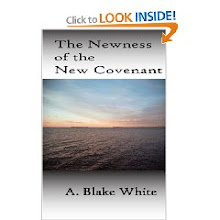 Introduction
IntroductionFor many months now I have been asked by several people to give (in some format or another) a synopsis of three major views regarding how the message of Scripture fits together. This desire grew out of a Sunday school class that I taught primarily dealing with what is known as New Covenant Theology. To be honest, I did not know exactly how to do this. I thought, should I write a paper? I concluded no. That is too academic. Should I preach a sermon on this topic? I concluded no. I am enjoying my preaching series through Colossians too much. For months I did not know how to do this until I decided to start a blog. In fact, this was one of the primary reasons for starting the blog. It provides a convenient opportunity to discuss issues like this apart from a Sunday sermon or Sunday school class (or an academic paper for that matter...that sounds boring to most people). Therefore, in the next few posts the three most common and systematized theologies will be explained, and examined to some degree. In other words, I will give an overview (and that is all that it is...trust me) of the most common methods among theologians on the topic of how the message of the Bible fits together. I call these theological systems because the adherents of each system all claim that a holistic interpretation of Scripture supports their respective system. In other words, each school of thought seeks to establish a logical, cohesive, and Biblical (thus theological) argument. All three positions are considered evangelical, and (generally speaking) all of its adherents believe in the authority and inerrancy of Scripture. In addition, all three systems support an evangelical, Biblical understanding of the Gospel as well.
As one studies these respective systems it is important to bear in mind that various men hold to hybrid positions regarding these three systems. For example, one might be “dispensational” in his view on the future for ethnic Israel, but “covenantal” in that he supports an overarching covenant of grace given in the Garden of Eden. If that example confuses you, then just ignore it. Perhaps by the end of the blog postings it might make sense.
Our examination will begin with dispensational theology (DT), also known as dispensationalism. DT was not organized as a system until the 19th century by J.N. Darby. DT is probably the view held most prominently today by evangelical laymen as a whole even though many are not aware of it. Popular author Tim LaHaye has made this position even more famous in recent years due to the publication of his book series entitled Left Behind.
An examination of DT will be followed by an examination of covenant theology (CT). If DT is the most popular today, then CT is considered the most classical of all the positions. In addition, it is the position held by most Reformed folk. It was made famous during the Protestant Reformation. Most give its organizational credit to the famous reformer Ulrich Zwingli. Although, some would downplay Zwingli’s direct contribution.
We will conclude with an examination of New Covenant Theology (NCT). Men like Tom Wells, John Reisinger, and Fred Zaspel have made this view popular. Labeled by many as a “grass roots” movement among the churches, NCT is quickly gaining popularity among those of the reformed Baptist persuasion.
The purpose of these posts is not to critique each system in detail. Rather, these posts are to provide general, objective information concerning the primary tenets of each system of thought. When I discuss New Covenant Theology it will be obvious which system I personally hold to. In this discussion, I will critique the other two schools of thought (DT and CT) a little more directly.
Any questions or comments are encouraged! The time frame on the posts will be determined on how much discussion is generated. For instance, if there are no comments after my posting on the topic of Dispensationalism, then I will move on to the next system- CT. I pray that these posts will be helpful, especially to those who have been waiting for me to do this for months. Thanks for your patience (and persistence).
Love in Truth,
Andy








Hello! Thanks for being willing to take on this mammoth of a project.
ReplyDeleteSmall Question and I hope this does not create work for you ... but - Is there a huge difference between NCT and Progressive Dispensationalism?
In Christ forever,
R.Rao
For this particular series of blog posts, I have decided not to speak about progressive dispensationalism. When I give the features of dispensationalism, they will be descriptive of the classic breed (not progressive).
ReplyDeleteHowever, to answer your question, there are many similarities between progressive dispensationalism and NCT from what I hear. There would be key differences (I assume) regarding the nature of Mosaic law, and probably the future of ethnic Israel as well. But both groups attempt to view things through a historical-redemptive lens (the lens just might not be the same prescription).
Perhaps, I could anaylize progressive dispensationalism in a differnt post.
Blessings.
This is a great idea Andy - I'm really looking forward to these coming posts, as I have had many questions concerning these theological issues. Can't wait!
ReplyDeleteLaura